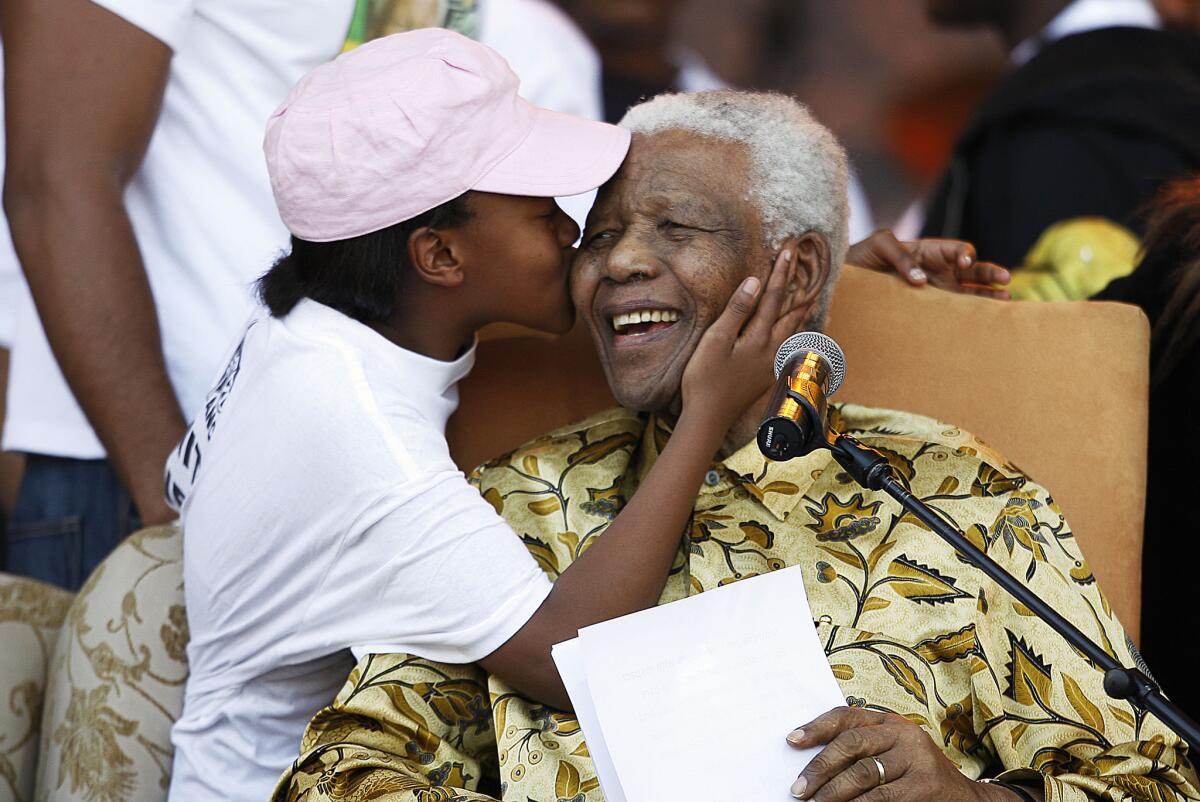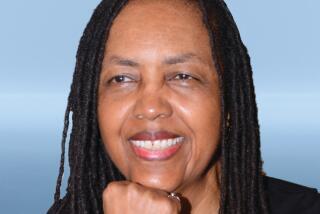The words of Nelson Mandela echo through the decades

- Share via
From a speech in the 1950s evoking the suffering of South Africa’s black majority to his expression of humility when released from prison, Nelson Mandela’s words etched the drama of his people.
“The living conditions of the people, already extremely difficult, are steadily worsening and becoming unbearable....
“The farm laborers are in a particularly dire plight.... You will recall how human beings, wearing only sacks with holes for their heads and arms, never given enough food to eat, slept on cement floors on cold nights with only their sacks to cover their shivering bodies. You will remember how they are woken up as early as 4 a.m. and taken to work on the fields with the indunas [foremen] sjambokking [whipping] those who tried to straighten their backs, who felt weak and dropped down because of hunger and sheer exhaustion. You will also recall the story of human beings toiling pathetically from the early hours of the morning till sunset, fed only on mealie meal [corn porridge] served on filthy sacks spread on the ground and eating with their dirty hands. People falling ill and never once being given medical attention. You will also recall the revolting story of a farmer who was convicted for tying a laborer by his feet from a tree and [having] him flogged to death, pouring boiling water into his mouth whenever he cried for water. These things which have long vanished from many parts of the world still flourish in South Africa today.
“The attitude of the government to us is that, ‘Let’s beat them down with guns and batons and trample them under our feet. We must be ready to drown the whole country in blood if only there is the slightest chance of preserving white supremacy....
“But gone forever are the days when harsh and wicked laws provided the oppressors with years of peace and quiet. The racial policies of the government have pricked the conscience of all men of goodwill and have aroused their deepest indignation. The feelings of the oppressed people have never been more bitter. If the ruling circles seek to maintain their position by such inhuman methods, then a clash between the forces of freedom and those of reaction is certain. The grave plight of the people compels them to resist to the death the stinking policies of the gangsters that rule our country.
“Here in South Africa, as in many parts of the world, a revolution is maturing: It is the profound desire, the determination and the urge of the overwhelming majority of the country to destroy forever the shackles of oppression that condemn them to servitude and slavery. To overthrow oppression has been sanctioned by humanity and is the highest aspiration of every free man....
“You can see that there is no easy walk to freedom anywhere, and many of us will have to pass through the valley of the shadow again and again before we reach the mountaintops of our desires.
“Dangers and difficulties have not deterred us in the past. They will not frighten us now.”
A speech in Sophiatown, Johannesburg, in 1953, calling for stronger action against the apartheid government after the failure of the Defiance Campaign of peaceful strikes and bans led by the African National Congress and the South African Indian Congress. From then, Mandela worked within the ANC to abandon its nonviolence policy and later founded the armed military wing.
*
“During my lifetime I have dedicated myself to this struggle of the African people. I have fought against white domination, and I have fought against black domination. I have cherished the ideal of a democratic and free society in which all persons live together in harmony and with equal opportunities. It is an ideal which I hope to live for and to achieve. But if needs be, it is an ideal for which I am prepared to die.”
Mandela’s address on being sentenced to life imprisonment for sabotage at his trial in Rivonia, 1964
*
“I learned that to humiliate another person is to make him suffer an unnecessarily cruel fate. Even as a boy, I defeated my opponents without dishonoring them.”
From his autobiography, “Long Walk to Freedom”
*
“In real life we deal, not with gods, but with ordinary humans like ourselves: men and women who are full of contradictions, who are stable and fickle, strong and weak, famous and infamous.”
From a 1979 letter to his second wife, Winnie Madikizela-Mandela
*
“One issue that deeply worried me in prison was the false image that I unwittingly projected to the outside world; of being regarded as a saint. I never was one, even on the basis of an earthly definition of a saint as a sinner who keeps on trying.”
From the sequel to his autobiography, published in his 2010 book “Conversations With Myself”
*
“I cherish my own freedom dearly, but I care even more for your freedom. Too many have died since I went to prison. Too many have suffered for the love of freedom. I owe it to their widows, to their orphans, to their mothers and to their fathers who have grieved and wept for them. Not only I have suffered during these long, lonely, wasted years. I am not less life-loving than you are. But I cannot sell my birthright, nor am I prepared to sell the birthright of the people to be free.”
In January 1985, then-President P.W. Botha offered to give Mandela his freedom if he rejected violence as a political weapon. Mandela’s response to the offer was read by his daughter Zindzi to a rally in Soweto on Feb. 10, 1985.
*
“Thank you very much for your attention and thank you for being kind to an old man — allowing him to take a rest, even if many of you may feel that after loafing somewhere on an island and other places for 27 years the rest is not really deserved.”
Announcement of Mandela’s retirement from public life, June 2004
*
“My friends, comrades and fellow South Africans, I greet you in the name of peace, democracy and freedom for all. I stand here before you not as a prophet but as a humble servant of you, the people. Your tireless and heroic sacrifices have made it possible for me to be here today. I have therefore placed the remaining years of my life in your hands.”
Mandela upon his release from prison in 1990
*
“Our grief and anger is tearing us apart.... Now is the time for all South Africans to stand together against those who, from any quarter, wish to destroy what Chris Hani gave his life for — the freedom of all of us....
“This is a watershed moment for all of us.... We must not let the men who worship war and who lust after blood precipitate actions that will plunge our country into another Angola.”
Mandela made a televised address calling for peace after the assassination of black Communist Party leader Chris Hani in April 1993 threatened to derail the peace process and even spark a civil war.
*
“We want to know: If life itself was threatened, as apartheid threatened the very existence of those who are black, was it not imperative that everything be done to end apartheid — and if necessary by force of arms?”
From Mandela’s speech at the funeral of liberation leader and ANC hero Oliver Tambo in May 1993
*
“I have often wondered whether a person is justified in neglecting his own family to fight for opportunities for others. Can there be anything more important than looking after your mother approaching the age of 60, building her a dream house, giving her good food, clothing and all one’s love? Is politics in such cases not a mere excuse to shirk one’s responsibilities? It is not easy to live with a conscience that raises such questions from time to time.”
From an unpublished autobiographical manuscript written in prison. Mandela’s mother and son died while he was behind bars.
*
“I came across a snake crossing the road. It was already twisting, you see, because of the heat underneath — he couldn’t bear the heat. And it was twisting but it was too close for me to do anything else so I what-you-call [ran] over it. My heart was sore. Because it jumped up, you know, as it was dying, you see. And I couldn’t do anything. I just didn’t see it, man. Yes, poor chap. And there was no reason why I should kill, you know? It was no threat to me.”
From a conversation with biographer Richard Stengel on running over a snake, published in “Conversations With Myself”
ALSO:
PHOTOS: Nelson Mandela through the years
PHOTOS: The world reacts to Nelson Mandela’s death
Nelson Mandela dies: Watch his 1st TV interview, prison release, more
More to Read
Sign up for Essential California
The most important California stories and recommendations in your inbox every morning.
You may occasionally receive promotional content from the Los Angeles Times.










